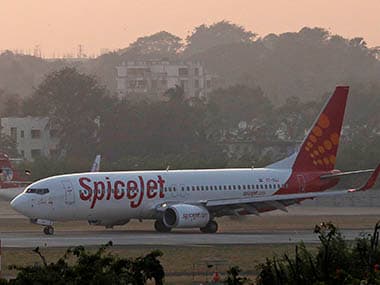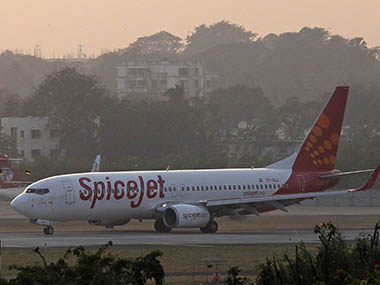Even as budget airline SpiceJet is expected to lease seven Boeing 737 aircraft this fiscal to replace some of its existing fleet, the airline is unlikely to purchase new planes. As it continues to negotiate with potential strategic investors for bringing in much needed funds to meet its working capital, it would do well toavoid stressing its balance sheet.
An analyst with a leading brokerage in Mumbai said after meeting the airline management that funds are needed in the short term for the airline’s day-to-day operations. “Typically, SpiceJet promoters raise their stake by 5% in the airline each year and thereby infuse fresh funds. This year’s promoters’ stake increase has already happened. So I don’t see any other way but a strategic partner acquiring some stake in the airline to bring in cash,” this analyst said, requesting anonymity.
That SpiceJet is starved of funds is obvious.
According to a story in the Times of India, the Airports Authority of India (AAI) had put SpiceJet on cash-and-carry mode late last month after the airline overshot its bank guarantee which was not cleared despite reminders from the AAI. This has however, been refuted by the airline.
[caption id=“attachment_1117559” align=“alignleft” width=“380”]  A SpiceJet aircraft taxis on the tarmac after landing at Chhatrapati Shivaji international airport in Mumbai. Reuters[/caption]
In a recent outlook, aviation consultancy CAPA published for 2013 for Indian airlines, it has estimated that Spice Jet immediately needs funds to the tune of $200-230 million. While, $120-130 million is for future fleet commitments, its working capital requirements as of March 2013 was between $70-100 million.
SpiceJet has been negotiating with several foreign airlines and institutional investors for a possible minority stake sale but talks have not fructified till now.
While its CEO Neil Mills resigned shortly after the airline’s Chief Commercial Officer Harish Kutty left this July,the management is not in a hurry to replace either, said the analyst. So unless the top management vacancies are filled and a strategic investor is roped in, SpiceJet’s working capital woes are likely to remain.
Impact Shorts
More ShortsThe airline currently operates a fleet of 56 aircraft - 41 Boeing 737s and 15 Q400. This analyst said there were no immediate plans from SpiceJet to augment its fleet of the Q400s. He also said that all available indications point to SpiceJet declaring a loss in the current quarter.
CAPA’s Kapil Kaul had said as much after SpiceJet declared its Q1 results: “Results expected in Q2 will hurt badly, impact future direction and increase near term fund requirement significantly. Further funding by the promoters might be inevitable before other sources of fund raising become feasible.”
Meanwhile, Antique Stockbroking said in a note to clients yesterday that Spicejet is expected to fly to 4-5 new international destinations every quarter which will improve its aircraft utilisation and reduce the currency risk. The report said that this fiscal, international revenues will account for a fifth of its total revenues at 20% against 13% in fiscal 2013.
“Stronger balance sheet with low leverage (due to leased fleet) in sector as compared to competitors facing problem of high debt, is advantage for Spicejet. It has added 14 Boeing and 15 Q400 aircraft over past two years and management focus on operational efficiency and growth will help the Spicejet to continue to grow going ahead,” the Antique report said.
Industry sources tells us that SpiceJet has wet-leased four Boeing aircraft between July and October, thereby lessening capacity and this should explain the decline in its market share seen in August.
A wet-lease means aircraft is leased with crew.
An aviation industry veteran said leasing aircraft during the lean season is a well known international practice and should be positive for any airline since lease is done at cost when the aircraft would otherwise have flown at a loss.


)

)
)
)
)
)
)
)
)



